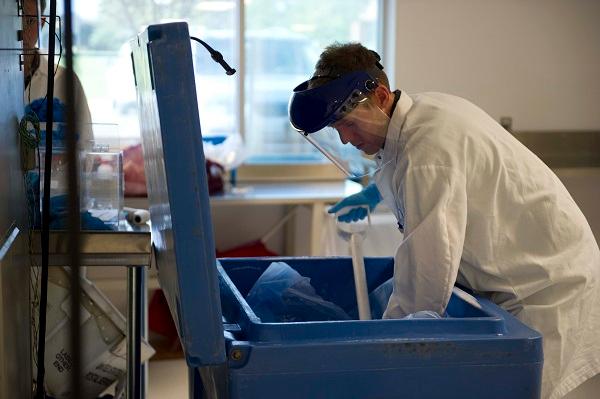
When you think of organ transplants, hearts, livers and kidneys may come to mind. But bones, tendons, cartilage and skin can also be transplanted from human cadavers. The Colorado nonprofit AlloSource -- one of the only companies of its kind in the country -- gets those body parts, sterilizes them and shapes them to fit individual patients. Once they’re ready, they get sent to hospitals around the nation.
“This is really a gift,” AlloSource CEO Tom Cycyota says. “The tissue that we’re processing today -- that person was alive yesterday. While we’re gifted with their tissue and trying to do some really cool stuff with it, that family is dealing with the grief of losing a loved one and we never forget about that.”
Cycyota says when people decide to become organ donors—typically when they’re signing up for new driver’s licenses—they’re also agreeing to donate tissue like bones, cartilage, tendons and skin.
Bones, tendons and cartilage are used for people who’ve had serious accidents, cancer and other conditions that damage tissue. Skin from donors is used for patients with serious burns.
Cycyota says for some people the idea of a “bone transplant” is tough to conceptualize.
“I tell people we’re like a medical device company except our material happens to be donated living tissue,” Cycyota says. AlloSource has also found a way to use stem cells from donors to heal bones more quickly.
Once the material arrives at the company’s processing center in Centennial, the parts need to be cleaned and disinfected. But not every donor’s tissue can be used -- and so the organization discards some of its donations. For example, Cycyota says, “There’s a large undiagnosed population of people that have hepatitis B or C.”
And Cycyota says one of the challenges of this kind of work is shaping the material to fit each patient. “We have a department that looks at x-rays and cat scans and tries to match what comes in with what the patient needs,” he says.
AlloSource also uses stem cells from donors to heal bones more quickly. Cycyota says when someone dies, their stem cells actually stay alive. “And we’re able to isolate the stem cells. So we have a product made up of stem cells that can be used for bone injuries that are hard to heal.”
AlloSource also has a new product made out of donated collagen that can be used for breast reconstruction following a mastectomy.









